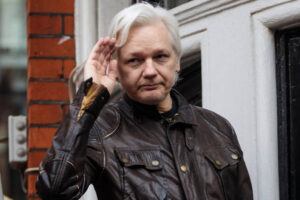Julian Assange, the founder of WikiLeaks, celebrated by some as a heroic whistleblower and promoter of transparency and freedom of the press, and reviled by others as a reckless leaker of classified information, has pleaded guilty in exchange for his release. Assange’s long and tumultuous legal battle with the United States took a dramatic turn yesterday. Assange, 52, pleaded guilty and admitted to conspiring with Chelsea Manning in unlawfully obtaining and disclosing classified national defense information, violating the Espionage Act, in exchange for his release. This plea deal has concluded this near 15-year-long fight in Assange’s life but will likely continue in ongoing discourse around whistleblowing.
The charges against Assange stem from a series of events that began in 2010 when WikiLeaks published a trove of classified U.S. military and diplomatic documents provided by Manning, a former U.S. Army intelligence analyst. These documents included approximately 90,000 Afghanistan war-related significant activity reports, 400,000 Iraq war-related reports, 800 Joint Task Force Guantanamo detainee assessment briefs, and 250,000 U.S. Department of State cables. Many of these documents were classified at the SECRET level, indicating that their unauthorized disclosure could cause serious damage to U.S. national security.
Unlike traditional news organizations that published redacted versions of the documents, WikiLeaks released many of the unredacted documents. This decision, which exposed the identities of individuals who had assisted the U.S. government, sparked widespread criticism. The U.S. government argued that Assange’s actions endangered lives and compromised national security.
Assange’s plea agreement marks the end of a legal battle that began in March 2018, when he was first indicted in the Eastern District of Virginia. Assange had been detained in the United Kingdom for 62 months while contesting extradition to the United States. As part of the plea agreement, Assange was transported to the U.S. District Court for the Northern Mariana Islands to enter his felony guilty plea. This venue was chosen to accommodate Assange’s opposition to traveling to the continental United States and its proximity to his native Australia.
Assange’s guilty plea has elicited mixed reactions. His legal team and supporters continue to argue that his actions were in the public interest and protected by the First Amendment. Barry Pollack, Assange’s U.S. lawyer, emphasized that WikiLeaks’ work would continue, and that Assange would remain a “continuing force for freedom of speech and transparency in government.” Pollock stressed “[Assange] is a powerful voice and a voice that cannot and should not be silenced.”
On the other hand, U.S. officials maintain that Assange’s actions went beyond the scope of journalism and endangered lives. The Department of Justice reiterated that Assange is prohibited from returning to the U.S. without permission.
Assange’s case has long resulted in debates over whistleblowing, press freedom, and national security. Supporters view Assange as a whistleblower who exposed government misconduct, while critics see him as a provocateur who recklessly endangered lives. The controversy surrounding his actions lies in the balance between the public’s right to know and the potential harm caused by the disclosure of classified information.
As Assange now returns home to Australia, his legacy and the future of WikiLeaks remain uncertain. The implications of his guilty plea on the future operations and reputation of WikiLeaks are significant. What is clear, however, is that the conversation around whistleblowing and the role of journalism in holding governments accountable will continue, fueled by the complex and controversial figure of ‘Julian Assange.’
If you think you have information pertaining to a whistleblower case or want to know more about whistleblower laws, please don’t hesitate to contact us to connect with an experienced member of our whistleblower team for a free and confidential consultation.
Read WikiLeaks Founder Julian Assange Pleads Guilty in Exchange for Release at constantinecannon.com






Leave A Comment